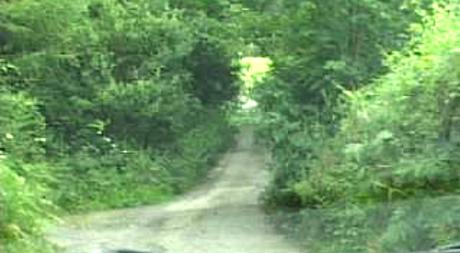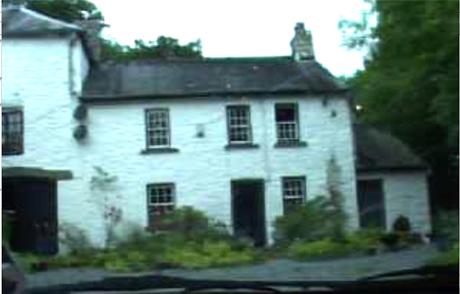[Ed Note: We recently learned about a film, The Golden Molecule, that was produced in 2002 and includes unique footage of Peter Pauling at his home in Wales. In today’s post, the maker of this film, Taslima Khan, shares her memories of Peter, his wife Alicia, and the home that they shared.]
Click here to view The Golden Molecule (2002) on Vimeo.
In 2001/02, I embarked on a Master’s course in Science Media Production in London. Part of that course involved making a science-related graduation film or radio programme. I chose to make a film. Since it was 2002, a year before the 50th anniversary of the discovery of the structure of DNA, I thought a re-examination of that discovery would be interesting film to attempt to make. The first step was to identify some interviewees.
Back in 2002 the internet was around but it wasn’t as vast as it is now, and the information resources we have today did not exist. Pages on the discovery of the structure of DNA, etc. were few and far between, so the only way to seek any interviewees was to open James Watson’s book, The Double Helix, and page by page note the name of every person mentioned in it. A long list in hand, I returned to the internet and searched for them. Jim Watson, and the late Francis Crick and Maurice Wilkins, were alive, but my £50.00 budget wouldn’t stretch to a visit to the USA in the unlikely event Watson or Crick entertained the idea of an interview with me. So, I approached King’s College London several times to see if I could meet Professor Wilkins – it was a “no” when they eventually replied. I continued down the list without much luck: fifty years is a long time to try and relocate people. Eventually, Peter’s name was next on my list.
I found a reference to Peter working at University College London, and a photograph of a laboratory dustbin that had apparently been in Peter’s lab in the Department of Chemistry. And that was it. There was no more information.
Like previous efforts, I felt there was no great hope of success, but I emailed the Chemistry Department at UCL requesting contact information for Peter, or details of anyone who knew him. Amazingly, a few days later, I received a reply. I was so happy. And relieved. An Emeritus Professor from Peter’s old department emailed me Peter’s telephone number. I telephoned the number and Peter answered…

The road to Abergwenlais Mill.
Peter and Alicia lived in a rural part of Wales, the kind of place where you go down long and narrow winding country roads with severe corners. If another car is coming the other way, you clench everything hoping the car would miraculously shrink in size too. It is also a Welsh speaking part of the country where they can spot a stranger a mile away, so locals, though friendly, could be a little intimidating.
I have to admit I was nervous as we approached Peter’s home and my mind was focused on getting a good interview. Consequently, I didn’t really notice the Mill itself where Peter and Alicia lived, except that it looked like a large, white, old, rural farmhouse, beautifully nestling in the Welsh countryside. Inside, Peter sat next to a large inglenook fireplace containing a huge wood burner and many logs. I seem to remember too, a spiral staircase that Peter went up to get some photographic plates of his research to show me.

The mill where Peter and Alicia Pauling built their home.
From our first meeting, I found Peter to be a gregarious, funny, serious, smart, and pleasant man. He had a lot of conversation and was quite mischievous. There was a definite twinkle in his eye highly suggestive, to me, of an exuberant past. Unfortunately he didn’t, or wouldn’t, elaborate. I did ask. To give you an idea, I noted this down:
Peter Pauling: “I think I’ve said but never printed, that Cambridge was full of English men and consequently there was a shortage of males! But it certainly was full of au pair girls.”
There was also mention of him enjoying Peterhouse College life in Cambridge:
Peter Pauling: “My academic career, scientific research career, was almost terminated in 1953 because Bragg was unhappy with me. The undergraduates at Peterhouse, it was their fault, because instead of being in the lab doing something, I was out rowing the bow in the gentlemen’s eight. The Peterhouse fifth boat!”
He chained smoked pretty much throughout our interview. He mentioned cancer and hospital visits and his lungs, and maybe even chemotherapy, but that was in passing. It wasn’t the main topic but it was something that was there. He didn’t complain but only mentioned tiredness. He was certainly a character.
Alicia was quieter. A very able lady, she demonstrably kept her eye on Peter as she looked after him and attended his needs. Sometimes she sat in on the interview or stayed mainly in the kitchen. She appeared used to Peter getting visitors from here, there and everywhere and took it in her stride; such as Jim Watson and his wife, who visited them every summer. They seemed a very content partnership.
Peter had kindly arranged overnight accommodation for me and my colleague at a local Inn, and it was there we had dinner together before a big interview session the next day. As we walked in, the locals raised their heads to see who was arriving. Established members of their community, there was a murmur of recognition for Peter and Alicia, and some customers raised their glasses in greeting. My colleague and I as strangers, I felt, aroused general interest, but as we were with Peter and Alicia, our presence didn’t seem an uncommon occurrence. Our meals were huge and both Alicia and Peter ate, and drank, and conversed, joyfully. All in all, they were entertaining and welcoming company.
Looking back, I am conflicted in a way. It remains of great regret that when I met Peter I knew so little about him outside of the DNA story. Having read more about his research and life since on the Pauling Blog, it would have been interesting ask him about those memories. Conversely, I interviewed the man I met and not the man I’ve since read about, and that is possibly a good thing too. Although our meetings were brief, Peter was an entertaining, joyful and erudite interviewee who liked a drink, to smoke, and to recall stories from the science world he inhabited, and perhaps (he’d admit) somewhat luckily, been a part of.
Advertisements